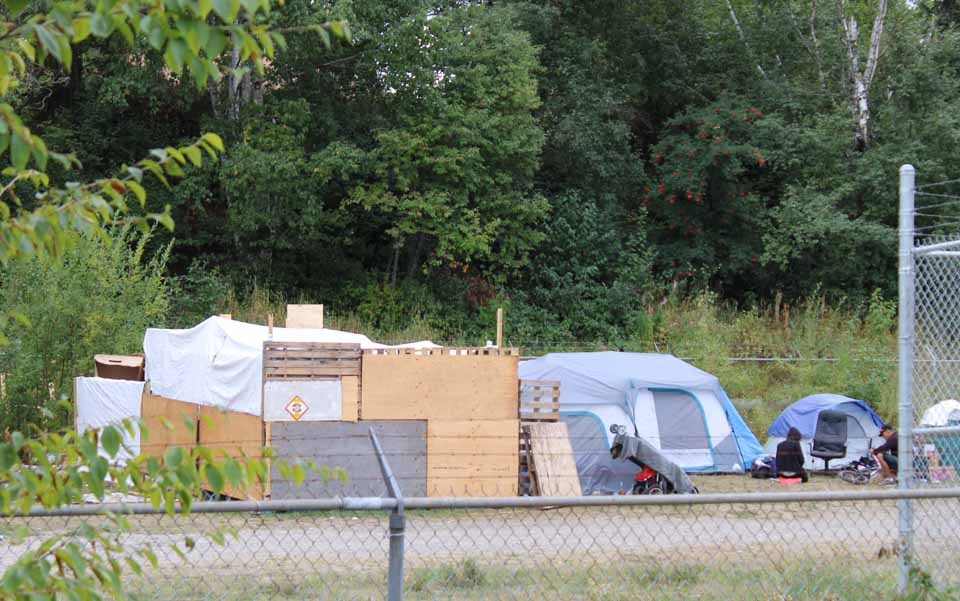A B.C. Supremce Court Justice has determined the tent city dubbed “Moccasin Flats” on Lower Patricia Boulevard in Prince George can stay in place.
In a ruling issued Friday (Oct. 22) Chief Justice Christopher Hinkson ruled on the City of Prince George’s injunction request to remove two encampments; one on Lower Patricia Boulevard and one on George Street.
The city’s application which was initially filed in August 2021 has drawn criticism from homeless advocates and the First Nations Leadership Council, because at least 79 per cent of Prince George's homeless population is Indigenous.
The effect of the ruling is that the encampment at George Street must be removed within seven days beginning Oct. 22. However, Hinkson ruled that the lower Patricia may remain until suitable housing is available.
He said as most of the occupants of the George Street encampment have migrated to the Lower Patricia site, he finds it unnecessary for George Street encampment to continue.
In his ruling, Hinkson ultimately found that there was inadequate shelter space available that the respondents could access, and they would also not be able to lawfully comply with the injunction without being in breach of the city’s Safe Streets Bylaw.
The Safe Streets Bylaw allows for ticketing for behaviours such as asking for money after dark or sleeping near doorways.
The RCMP estimated approximately 50 tent structures inside both encampments with over 80 occupants with the vast majority at the Lower Patricia site.
“The city’s assertion that there is enough housing available for the respondents makes no consideration of barriers to access to housing,” wrote Hinkson.
He accepted testimony from the occupants of the encampments who asserted that they sought to access open or more shelter options in the city but were unable to do so because the facility was full or they didn’t meet eligibility criteria.
“I accept the submission of the respondents that substance use disorders, lack of identification, the inability to meet application requirements, and the lack of bank accounts or records have prevented at least some of the homeless to secure alternate housing in downtown Prince George,” said Hinkson.
The city relied heavily on the evidence of Charlotte Peters, manager of bylaw services for the city of Prince George but Hinkson said due to the hearsay nature of the contents of her affidavit, he was unable to rely on much of her evidence.
He said there was no admissible evidence that crime has increased because of the encampments, or that homeless individuals sheltering together cause an increase in crime, or that displacing the residents of the encampments will lower incidences of crime.
Hinkson also said there is no evidence the risk of fires in the encampment are any greater than those in other parts of the city.
“It is apparent that very few of the emergency shelter beds are low barrier, and it appears that many of the homeless persons in the City are ineligible to stay in at least some of the shelters,” said Hinkson.
“While the City contends that the availability of 81 shelter beds in the City is sufficient to house the encampment occupants, I am not satisfied that these shelter spaces are in fact accessible to all of the occupants of the encampments.”
In a statement following the ruling, the City said it is reviewing the decision of Chief Justice Hinkson and will take the appropriate legal or practical steps necessary and will work closely with BC Housing to ensure the availability of shelter or housing to transition the occupants in Lower Patricia and George Street before the cold weather sets in.
“The City took this court action for the safety and protection of all of our citizens,” said Mayor Lyn Hall.
“While the provision of housing is outside of our jurisdiction, we will continue to work closely with BC Housing and other agencies to ensure the people in the encampments get the services and housing they need.”
The BC Assembly of First Nations, who opposed the city’s request for an injunction, has applauded Hinkson’s ruling.
“This decision will have far-reaching consequences,” stated BCAFN Regional Chief Terry Teegee.
“The City claimed that people had a place to go, which was clearly false. Chief Justice Hinkson saw through their arguments, and ruled that the City could not force people out of their tents when they had no other options.”
He noted that Hinkson’s ruling also referenced the Gladue decision, which takes colonial violence against Indigenous peoples into consideration in the justice system.
“The City of Prince George has been targeting homeless people, 80 per cent of whom are Indigenous, instead of working with First Nations organizations to solve the problem,” Regional Chief Teegee continued. “Today’s decision should give the city pause, and make them stop punishing our society’s most vulnerable. I continue to extend a hand towards the City of Prince George, and other municipalities in BC, to work together to put a stop to the homelessness crisis gripping this province.”
Homeless Advocacy Group, Together We Stand, also celebrated the decision.
“Along with the Safe Streets bylaw, the City of Prince George’s proposed Injunction would have made unhoused members of our community invisible and illegal,” stated the group in a news release.
“We ask the city to ensure that precariously housed community members are engaged in the planning for long-term housing and in the creation of reasonable temporary solutions. Unless housing becomes immediately available, residents of Moccasin Flats will need safe heating solutions for the winter.”
The group also stated the city is taking steps in the right direction with the recruitment of outreach workers and a commitment to work with First Nations agencies.
On Oct. 21 the City of Prince George announced it’s hired two outreach coordinators who will be responsible for connecting unsheltered persons with health and social services, including safe and affordable housing.






